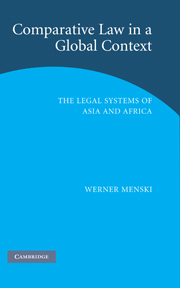Book contents
- Frontmatter
- Contents
- Preface and acknowledgments
- Table of cases
- Table of statutes
- List of abbreviations
- PART I Comparative framework
- Introduction: Globalisation and Asian and African legal systems
- 1 Comparative law and legal theory from a global perspective
- 2 Legal pluralism
- 3 Comparative jurisprudence: images and reflections of law
- PART II Regional comparisons in a global context
- Conclusion: towards global legal realism
- References
- Index
1 - Comparative law and legal theory from a global perspective
Published online by Cambridge University Press: 09 November 2009
- Frontmatter
- Contents
- Preface and acknowledgments
- Table of cases
- Table of statutes
- List of abbreviations
- PART I Comparative framework
- Introduction: Globalisation and Asian and African legal systems
- 1 Comparative law and legal theory from a global perspective
- 2 Legal pluralism
- 3 Comparative jurisprudence: images and reflections of law
- PART II Regional comparisons in a global context
- Conclusion: towards global legal realism
- References
- Index
Summary
The introduction indicated that the current state of jurisprudence and comparative law leaves much to be desired. There are disagreements about how to theorise and apply ‘law’. Law's constant demand for clearly defined categories has led to what Cowan et al. (2001: 10–11) call ‘the essentialising proclivities of law’. The discipline as a whole stands accused of misusing social categories and identities, claiming superior universal status for legal rules (p. 6) and ‘law’ itself has been essentialised in a reductionist manner (Griffiths, 2002: 293). In common parlance, the word ‘law’ itself immediately sets off all kinds of assumptions: ‘The mere word “law” has an honorific ring’ (Harris, 1980: 128). But we also know that all legal systems may fail to some extent to provide justice. Historical memories of slavery, Nazism, Apartheid and ongoing genocides evoke mixed feelings about the potential (ab)uses of law and legal systems. For many people ‘law’ remains associated with misuse of power, and disorder rather than order.
If globalisation means increasing hybridisation in locality-coloured and culture-specific forms worldwide, rather than uniformising homogenisation, lawyers need to be better equipped to understand the manifold pluralities within and between legal systems as complex entities with ragged boundaries. It seems that a plurality-focused understanding of globalisation challenges legocentric Western laws and questions much of what Western culture and modernity claim to stand for. Eurocentric legal theories claim universal validity while representing only a shrinking part of global humanity.
- Type
- Chapter
- Information
- Comparative Law in a Global ContextThe Legal Systems of Asia and Africa, pp. 25 - 81Publisher: Cambridge University PressPrint publication year: 2006



